- Home
- Seanan McGuire
The Winter Long Page 10
The Winter Long Read online
Page 10
“At least that means we know it’s not Oleander.”
“How’s that?” I skirted a brief sidelong glance in his direction.
Quentin shrugged. “If he’d been talking about Oleander, and their whole relationship was some sort of cover, the geas would have broken as soon as she was killed. Dead people can’t maintain that kind of binding. Oleander’s dead, so that means she didn’t hire him.”
“Great. Then we’re looking for a living person, powerful enough to throw a geas on Simon Torquill, with a grudge against Sylvester, and . . .” I paused again. “And against me, or at least against Amandine. Simon said my death was one of his employer’s goals.”
“That might be why he fled the Kingdom. If he wasn’t willing to kill you, and he was dealing with someone that powerful, that could have been the only way to prevent himself from being forced to go through with it.”
“Yeah.” I quieted, sinking into my thoughts. Who hated Sylvester that much? Who hated me that much? I couldn’t think of anyone, and I wasn’t sure I wanted to. The trouble was, I was going to have to figure it out, because until I did I had no way of knowing what had driven Simon out of the Kingdom, or what might have brought him running back, ready to “save me” again. Considering the way he’d saved me the first time, I wasn’t sure I could survive a second salvation.
Quentin must have caught my mood. He leaned forward, turning on the radio and flipping through the stations until he found the one that he usually liked to listen to, playing modern folk and light rock from Canada. The Barenaked Ladies were offering to light up my room. He started to sing along, quietly at first, then louder and louder, until I couldn’t fight my smile any longer. He grinned back.
“We’ll figure this out,” he said. “One way or another. I mean, what’s the worst he can do? Be spooky at you until Tybalt kicks his ass?”
“There’s the fish thing,” I said.
“I’d like to see him try.”
“You know, it’s a funny thing, but after everything that’s changed . . . so would I.” I hit the gas a little harder, and we left Pleasant Hill behind us.
SEVEN
CALIFORNIA HAS LAWS about motorists using their phones while they’re driving, and so I left it up to Quentin to call home while I focused on navigating San Francisco’s daytime traffic. I’ve been nocturnal long enough that driving during the day stresses me out. The streets were filled with homicidal drivers and suicidal pedestrians: cars turned the wrong way up one-way streets, while people crossed against the light, seemingly unaware of the giant metal death machines bearing down on them. I found myself swearing steadily, hands locked around the wheel.
Quentin got off the phone shortly after our third narrowly missed collision. He grimaced. “How do people do this every day?”
“I honestly don’t know,” I said. “What’s the news from home?”
“May says they’re both fine, and Jasmine is awake and showing no ill effects from Simon’s spell. Danny’s there in case they need to move. He brought soup and orange juice. Apparently the right way to deal with the aftermath of a magical assault is by treating it like the flu.”
He sounded so puzzled that I had to laugh. “Not the worst idea I’ve ever heard. What did she say when you told her we were heading for the Luidaeg’s?”
“That it was a damn good idea, and that as soon as Jazz is up for it, she’s going to have Danny take them to Muir Woods.”
I nodded. “Good plan. Arden will take care of them.” The traffic died as I turned onto a side street that was little more than a glorified alley, replaced by empty sidewalks and a deep, abiding silence. I forced my hands to relax, cutting my speed until we were gliding along, fast enough that it still felt like we were getting somewhere, slow enough that we weren’t going to mow down any unsuspecting bicyclists or tourists who had wandered into the wrong neighborhood.
And this was very much the wrong neighborhood for tourists. San Francisco is a city of many faces, with financial districts, slums, and upscale retail neighborhoods existing side-by-side. Maybe it’s the hills the city was built on, creating a series of minute geographical divides, but there are parts of San Francisco that feel like they should belong to some other city entirely.
Then there’s the Luidaeg’s neighborhood.
I knew we were getting close when first the cars and then the pedestrians dwindled to nothing, leaving us to drive alone down deserted, dangerous-looking streets. Everything around us seemed to fall into disrepair as we drove, and even the sky grew darker, dimmed by an omnipresent fog of the sort that the city is justly famous for. Broken glass glittered in the gutters, and crows perched on the telephone wires, croaking to themselves as we passed. This was the territory of the sea witch. All others had best beware.
Tybalt was waiting for us on the corner near her apartment, his hands jammed into his pockets and an impatient look on his face. I pulled up to the curb and killed the engine, smiling as I got out of the car.
“Been waiting long?” I asked.
“Not so long as you might think.”
“Good.” I started walking toward the Luidaeg’s apartment. Tybalt fell into step beside me, and Quentin brought up the rear as the three of us turned into the alley that housed her door. Then I stopped, blinking.
The Luidaeg was sitting on her front step, a pint of Ben and Jerry’s Cherry Garcia in her hand. She looked up as we approached. “Ah,” she said, sticking her spoon back into the ice cream and standing. “There you are. You’re late.”
“I didn’t know we had an appointment,” I said.
“You never do. Come on.” With that, she turned and walked through her open apartment door into the hallway beyond.
Tybalt and I exchanged a look. I shrugged, and we followed her inside. The door slammed behind us of its own accord. Apparently, we were going to be staying for a while.
It was hard to say how large the Luidaeg’s apartment was, since I’d only ever seen the hallway, living room, kitchen, and bedroom. Several other doors led off the hall. One of them was presumably a bathroom, but the rest were anybody’s guess. When you’re an undying daughter of Oberon and Maeve, normal physical laws apply only as much as you want them to.
She hadn’t bothered putting up her illusions before we came in. The place was spotless, with kelp-colored carpet and cream-colored walls. The air smelled of fresh seawater. If Yankee Candle could have figured out how to bottle that scent, they could have cornered the home fragrance market and put all their competitors out of business in a season. When we reached the living room, we found her sitting in an overstuffed easy chair, stirring her ice cream into an unrecognizable slurry.
“This is going to suck,” she said, without preamble. “You’re here because Simon Torquill is back in town, and you want answers. I get that. The problem is, those answers are like a crunchy candy shell surrounding a chewy center of shit I can’t talk about. Not won’t, can’t. As in, ‘I am physically unable to tell you what you came here hoping to find out, and there’s no way you can word the questions that will get us around that little glitch.’” She sounded genuinely sorry.
I paused, studying her. The Luidaeg didn’t just sound sorry; she looked sorry. Her shoulders were slumped, and her eyes were fixed on her ice cream, like she couldn’t bear to look at us. She seemed perfectly human, with her dark, curly hair hanging loose around her face, which still bore the ghosts of old acne scars. There wasn’t even the faint glitter of an illusion to mark her as fae, but that was a reflection of how powerful she really was. Only one of the Firstborn could mask their nature that completely.
“Is this because of a geas?” I ventured.
“Ten points for Amandine’s daughter,” said the Luidaeg, and licked half-melted ice cream off her spoon before jabbing it viciously back into the container. She raised her head and looked at me. Her eyes were the pale green of sea-tumbled glass, and ful
l of fathomless desperation. “I can’t, Toby. You know I can’t.”
“I know.” I worried my lip between my teeth for a moment before I asked, “Can I try finding some questions that don’t break any of the rules, but that might help us out?”
“You can try,” she said.
“Do you know where Simon Torquill is?”
The Luidaeg blinked. Then she shook her head. “No. He can hide himself from me, the bastard. Old magic, borrowed from your mother, no doubt.”
I nodded slowly, tensing a bit. “So you can talk about Mom and Simon.”
“That was never technically a secret.” She sighed. “I never brought it up with you because, well. What good would it have done? Amy was off in her private fairyland, and Simon was Dad-knows-where. Telling you how they used to do the nasty wouldn’t have helped you any, and it might have made it harder for you to sleep.”
“Especially if you worded it like that,” I said, wrinkling my nose. “Luidaeg . . . Mom left him, right? She must have, since she got together with my father. So why didn’t she divorce him? There was no land to fight over, and she never took his title. Sylvester said it was because that would mean admitting there was no hope for them, but that just . . . that didn’t sound right. Something was missing. What isn’t he telling me?”
“It didn’t sound right because it was only half the story. Fae marriage is a funny, funny thing,” said the Luidaeg. “Easy to do, easy to undo, that was always the goal. Dad wanted us to enjoy the same happiness with each other that he had with my mother and with his pretty Summer Queen—and he wanted it to be just as fleeting. Give us eternity and we still measure our lives by the span of seasons.” She looked at her ice cream, sighed, and put it aside.
“Some of us believe marriage is for longer than a season’s time,” said Tybalt mildly.
“Sure, and some of you believe a marriage that lasts longer than a month is some sort of crime against nature.” The Luidaeg shook her head. “It’s all easy, as long as you only have the people who are getting married to worry about.”
I frowned. “Wait, what are you . . .” My voice trailed off as a thought struck me. It was the sort of thought I didn’t enjoy having, didn’t want to be having, and would probably have paid a considerable amount to stop having. “Fae marriages can be ended at any point by the spouses saying ‘we don’t want to be married anymore,’ unless there are children.”
“Any children have to declare which parent they wish to follow, just like all us Firstborn had to declare which parent we belonged to,” said the Luidaeg. There was an edge to her words, like they carried a meaning the rest of us hadn’t picked up on yet. “It keeps lines of succession straight. But if the child is unable to choose, the marriage must endure.”
“Oh, sweet Titania’s ass, please don’t tell me I’m like Arden and I have an elf-shot brother in a box somewhere,” I moaned, pinching the bridge of my nose with one hand.
“No, that would be easier,” said the Luidaeg. “You have a sister, and she hasn’t been elf-shot, although whether she’s alive or not is anyone’s guess. Her name is August. She’s been missing for over a hundred years, which means the only way your mother can divorce Simon is to admit that August is dead. Until that happens, August has a say in the separation.”
I lowered my hand, staring at her. “A hundred years? You mean . . .”
“She disappeared just before the earthquake. Just before King Gilad died and this Kingdom went to shit.” The Luidaeg’s gaze was as dispassionate as the sea that she was named for. “The numbers all align, when you start looking at them properly.”
“I am . . . I am not even going to ask you why you never thought I should know that I have a sister who’s been missing since before I was born, and am instead going to skip ahead to asking again why you never told me my mother was married to the man who turned me into a fish. You say it would have made it hard for me to sleep. I say I still needed to know.”
“Really?” The Luidaeg tilted her head. “Why is that exactly?”
I blinked at her. “What?”
“I regret saying this even before I have said it, but . . . perhaps there is value in her question,” said Tybalt slowly. “When you first returned to us, you were consumed by despair, and by the longing for vengeance. But what Simon did was not forbidden under any known reading of fae law—he turned a changeling into an animal. There are many who would say that a changeling is already an animal, and so he merely altered your breed. Had you been told, then and there, that Simon Torquill was your stepfather—could anything have induced you to rebuild your bridges with Shadowed Hills? Or would you have devoted your every waking moment to tracking Simon down and getting your revenge, no matter what the cost?”
“You couldn’t have defeated Simon as you were; I frankly doubt you could defeat him now,” said the Luidaeg.
“I like being your squire,” said Quentin. “I’m kind of glad you didn’t know any of this sooner.”
I groaned. “When are you people going to learn that withholding information is not the way to endear yourselves to me?”
“I’m the only one here who withheld anything, Toby, and I did it because you never asked—and yes, because it was a little bit in your best interests, although I would have answered if you’d ever figured out what questions you needed to ask. I’ve always had a plan, and you’ve always been part of it.” The Luidaeg shrugged. “You running off and getting yourself killed stupidly didn’t have a good enough payoff for me.”
“Okay,” I said, pinching the bridge of my nose again. “We’re not only getting off topic, you’re making me want to throw things at all of you. So let’s move on for right now and I can be pissed off later. Simon said something about having been hired to do what he did to Luna and Rayseline, and not expecting me to be a part of his job. Do you know who his employer was?”
“Yes,” said the Luidaeg.
“Can you tell us who his employer was?”
“No.” She opened her mouth like she was going to continue, and froze for a long moment, visibly struggling. Finally, she sagged back in her chair and spat to the side, looking disgusted. “Fuck. I can’t tell you anything. I can’t even get so far as animal, vegetable, or mineral. Simon’s employer is off limits.”
“Okay.” I frowned, lowering my hand. “So whoever hired Simon is alive, and you can’t say their name, right?” The Luidaeg nodded. “Did this person cast the geas on you themselves, or was it cast by someone else?”
“They cast it themselves,” said the Luidaeg. She paused, looking both surprised and pleased. “I wasn’t sure I could tell you that. Yes. This geas was created by the person whose name I can’t say.”
If learning this person’s name was as important as I was starting to think it might be, we had a way of doing that. I just didn’t want to suggest it until we’d exhausted all other avenues, since it would involve me sampling the Luidaeg’s blood. The blood of a Firstborn is nothing to mess around with. No matter how strong my magic got, I was never going to forget how weak I was compared to them. “Could I create a geas powerful enough to bind you?”
The Luidaeg snorted. “No. You’re a changeling. Even if you weren’t, you’d have to get me to drink your blood if you wanted to bind me like that. And that’s not going to happen any time soon.”
“Who could?”
There was a pause as she sorted through the words that she was allowed to say. Finally, she said, “Any of my siblings, if I let them get close enough; any son or daughter of Titania. Oaths are a form of illusion, after all. Your squire would have a better chance of binding me than you would, because at least he has the Summer Queen’s blood, if not her blessing.”
“. . . right.” There were too many descendants of Titania to rattle off in a list; even if I named every single one I knew, there were hundreds more within the Kingdom. It didn’t help that she didn’t formally claim all
her descendant lines. Some of them were considered children of Oberon, thanks to the whole “fae children can only inherit from one parent” structure inherent in our society. “Is it someone I know?”
“Yeah.”
The Luidaeg and I both froze. It had been a softball question, one I expected to have lobbed back at me with an immediate refusal; something to keep the conversation going.
“What do you—”
“You have to leave now.” For a moment, I would have sworn I saw genuine fear in her face. The moment passed, but the memory of it lingered. “I mean it. Get out.”
“Luidaeg—”
She pushed herself out of her chair. Her eyes were still green, and her skin was still tan and human; her form wasn’t slipping, which was the most frightening thing of all, given how agitated she looked. I’d never seen her this upset without her fae nature beginning to bleed through. Her forgotten pint of Ben and Jerry’s fell to its side on the floor as she stood, spilling ice cream everywhere. She ignored it, advancing on me.
“This is my fault. I know it’s my fault. I should never have let you get so comfortable. You started thinking of me as harmless. I’m safe. I’m the monster at the end of the book, the one that you run to when the bigger monsters start threatening to eat you, but that’s not right, Toby, that’s not right, you forget yourself. You forget me. I am the scariest thing that has ever gone bump in the night. I am what you knew, at the bottom of your unformed child’s heart, was lurking in the back of your closet. And what I am telling you, right here and right now, is that you need to leave, because I am afraid of what will happen if you don’t.”
I stared at her, fighting the urge to take a step backward. Something told me that retreating would mean showing weakness, and showing weakness would be a mistake. “I’m not scared of you. If you were going to kill me, you’d have done it a long time ago, and it wouldn’t have been over a yes or no question.”

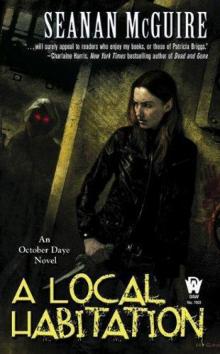 A Local Habitation
A Local Habitation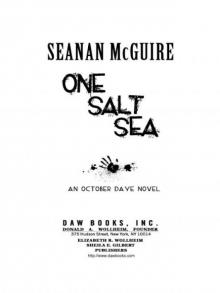 One Salt Sea
One Salt Sea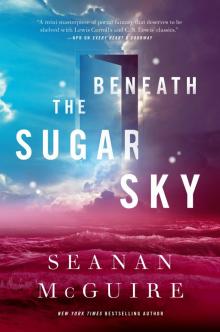 Beneath the Sugar Sky
Beneath the Sugar Sky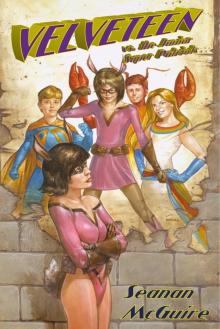 Velveteen vs. The Junior Super Patriots
Velveteen vs. The Junior Super Patriots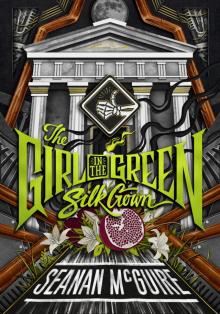 The Girl in the Green Silk Gown
The Girl in the Green Silk Gown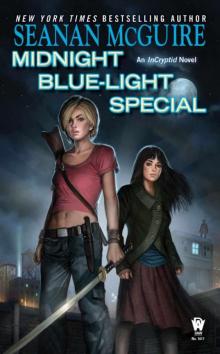 Midnight Blue-Light Special
Midnight Blue-Light Special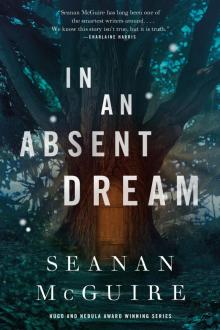 In an Absent Dream
In an Absent Dream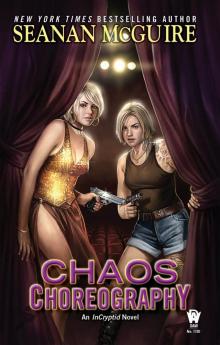 Chaos Choreography
Chaos Choreography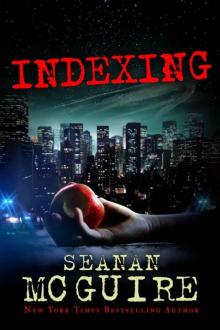 Indexing
Indexing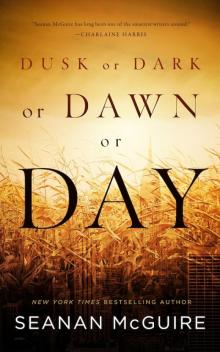 Dusk or Dark or Dawn or Day
Dusk or Dark or Dawn or Day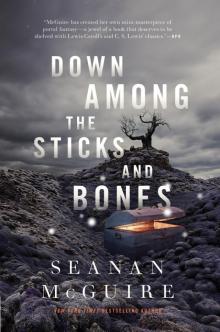 Down Among the Sticks and Bones
Down Among the Sticks and Bones The Razor's Edge
The Razor's Edge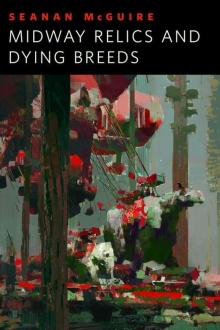 Midway Relics and Dying Breeds
Midway Relics and Dying Breeds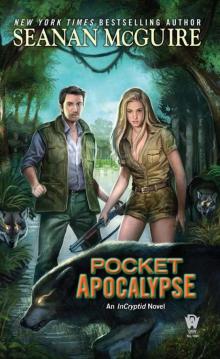 Pocket Apocalypse
Pocket Apocalypse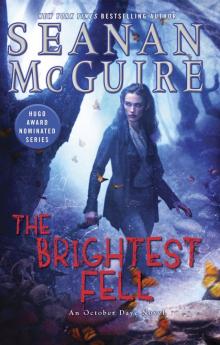 The Brightest Fell
The Brightest Fell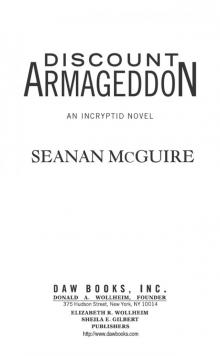 Discount Armageddon
Discount Armageddon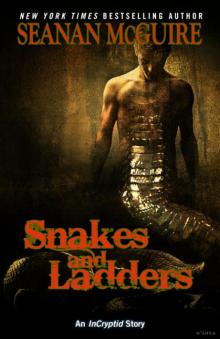 Snakes and Ladders
Snakes and Ladders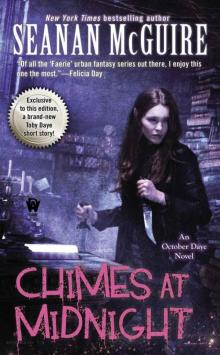 Chimes at Midnight
Chimes at Midnight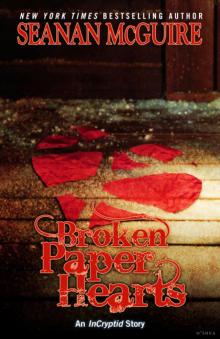 Broken Paper Hearts
Broken Paper Hearts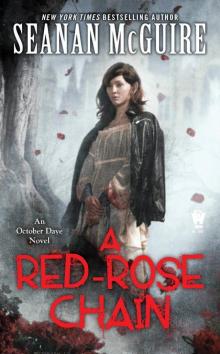 A Red-Rose Chain
A Red-Rose Chain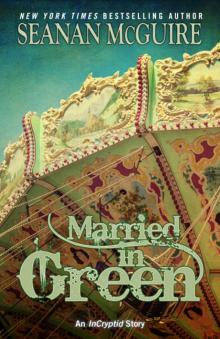 Married in Green
Married in Green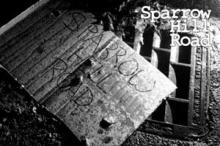 Sparrow Hill Road 2010 By Seanan
Sparrow Hill Road 2010 By Seanan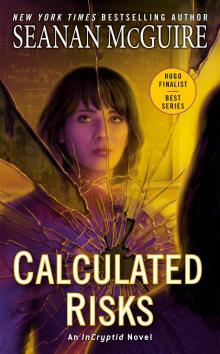 Calculated Risks
Calculated Risks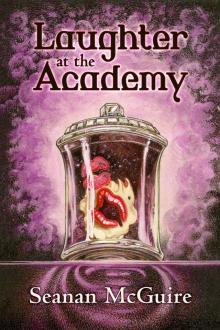 Laughter at the Academy
Laughter at the Academy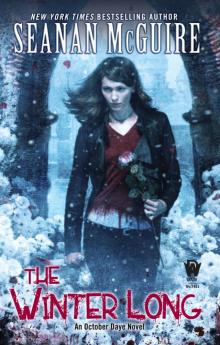 The Winter Long
The Winter Long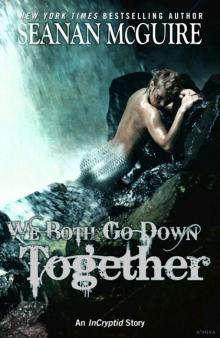 We Both Go Down Together
We Both Go Down Together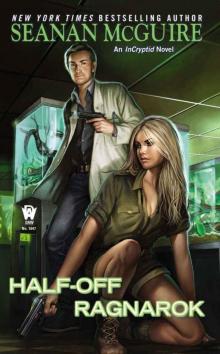 Half-Off Ragnarok
Half-Off Ragnarok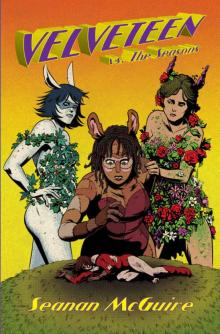 Velveteen vs. The Seasons
Velveteen vs. The Seasons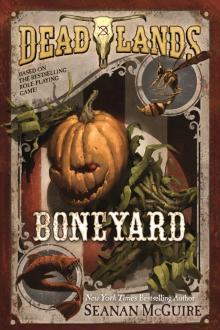 Boneyard
Boneyard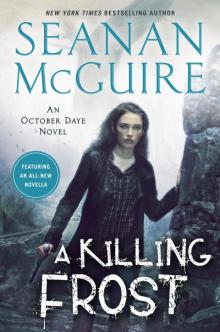 A Killing Frost
A Killing Frost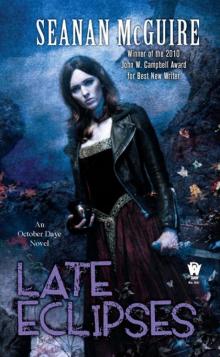 Late Eclipses
Late Eclipses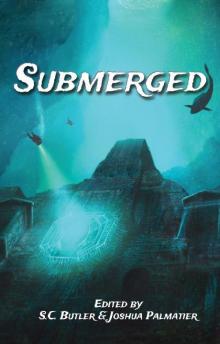 Submerged
Submerged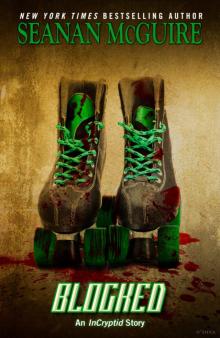 Blocked
Blocked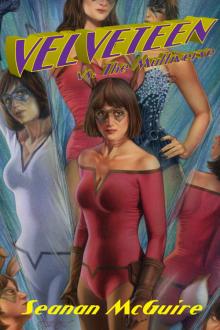 Velveteen vs. The Multiverse
Velveteen vs. The Multiverse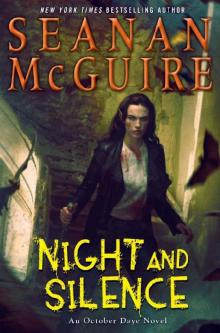 Night and Silence
Night and Silence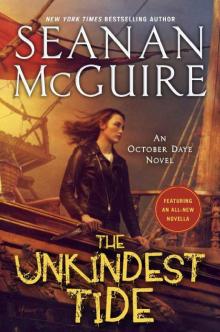 The Unkindest Tide (October Daye)
The Unkindest Tide (October Daye)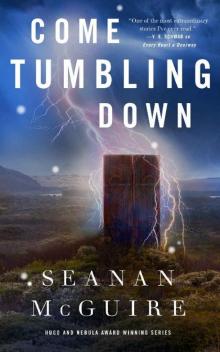 Come Tumbling Down (Wayward Children)
Come Tumbling Down (Wayward Children)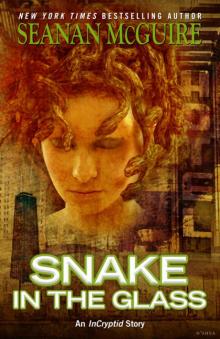 Snake in the Glass
Snake in the Glass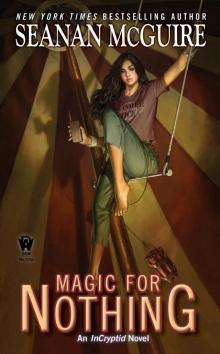 Magic for Nothing
Magic for Nothing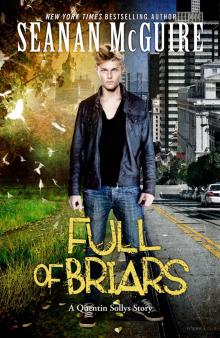 Full of Briars
Full of Briars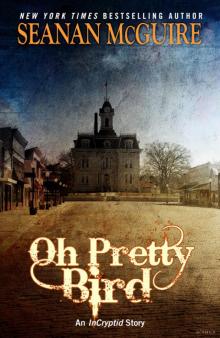 Oh Pretty Bird
Oh Pretty Bird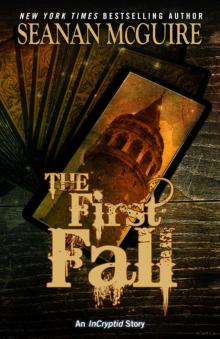 The First Fall
The First Fall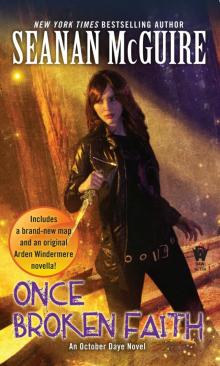 Once Broken Faith
Once Broken Faith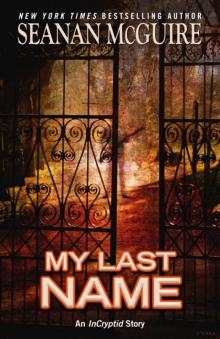 My Last Name
My Last Name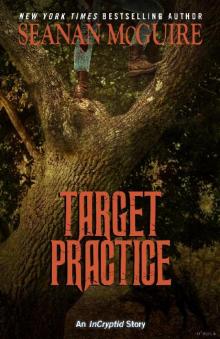 Target Practice
Target Practice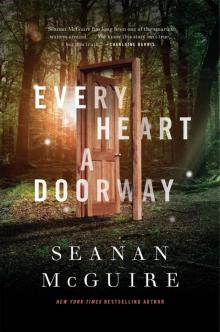 Wayward Children 01 - Every Heart a Doorway
Wayward Children 01 - Every Heart a Doorway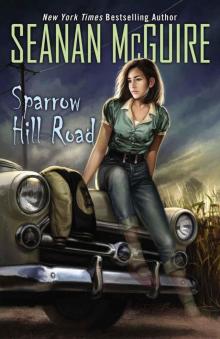 Sparrow Hill Road
Sparrow Hill Road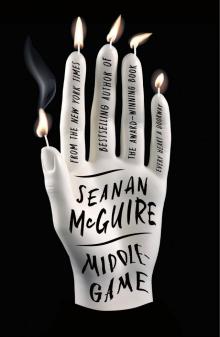 Middlegame
Middlegame Juice Like Wounds
Juice Like Wounds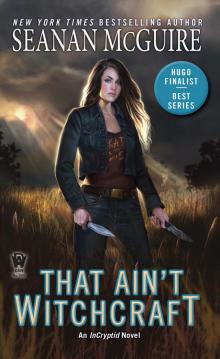 That Ain't Witchcraft
That Ain't Witchcraft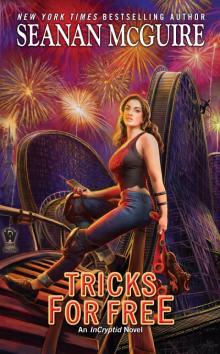 Tricks for Free
Tricks for Free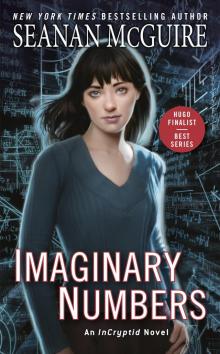 Imaginary Numbers
Imaginary Numbers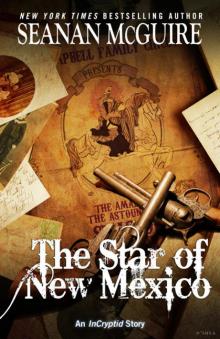 The Star of New Mexico
The Star of New Mexico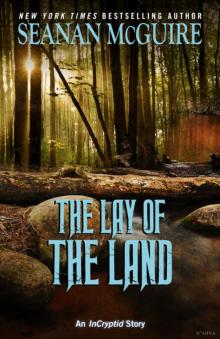 Lay of the Land
Lay of the Land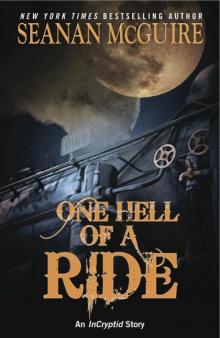 One Hell of a Ride
One Hell of a Ride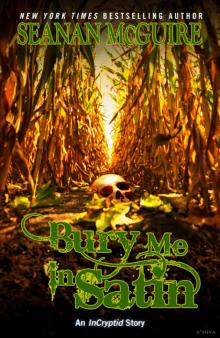 Bury Me in Satin
Bury Me in Satin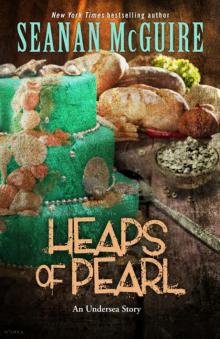 Heaps of Pearl
Heaps of Pearl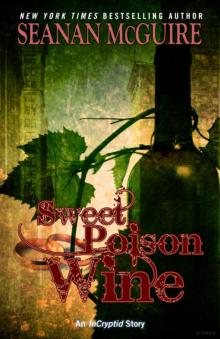 Sweet Poison Wine
Sweet Poison Wine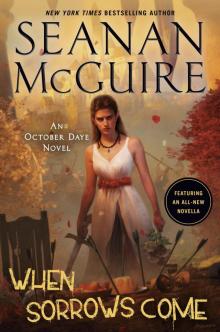 When Sorrows Come
When Sorrows Come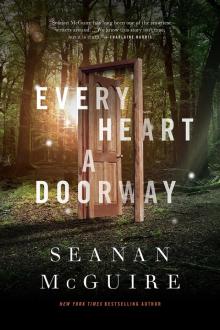 Every Heart a Doorway
Every Heart a Doorway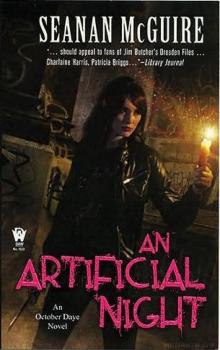 An Artificial Night - BK 3
An Artificial Night - BK 3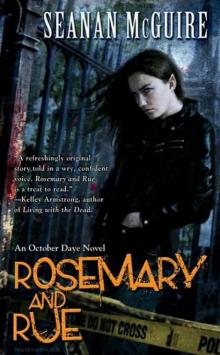 Rosemary and Rue
Rosemary and Rue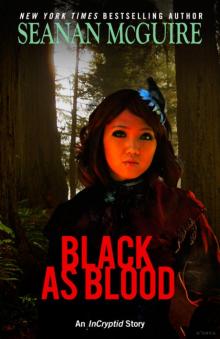 Black as Blood
Black as Blood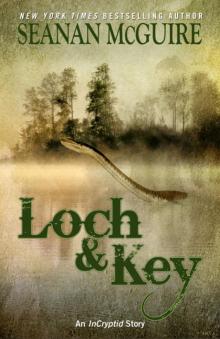 Loch and Key
Loch and Key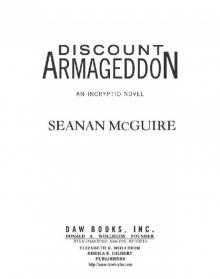 Discount Armageddon: An Incryptid Novel
Discount Armageddon: An Incryptid Novel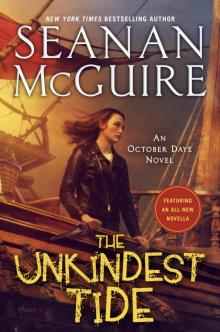 The Unkindest Tide
The Unkindest Tide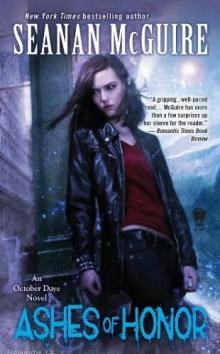 Ashes of Honor od-6
Ashes of Honor od-6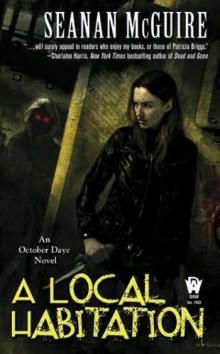 A Local Habitation od-2
A Local Habitation od-2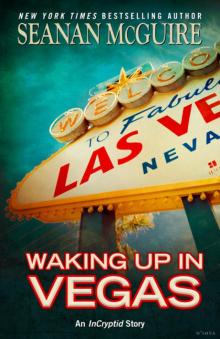 Waking Up in Vegas
Waking Up in Vegas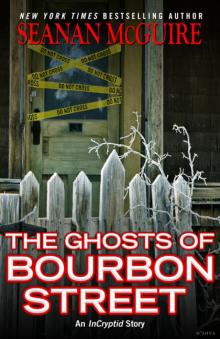 The Ghosts of Bourbon Street
The Ghosts of Bourbon Street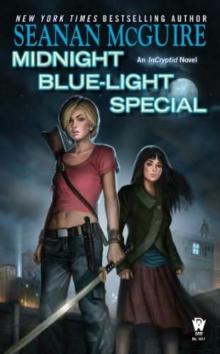 Midnight Blue-Light Special i-2
Midnight Blue-Light Special i-2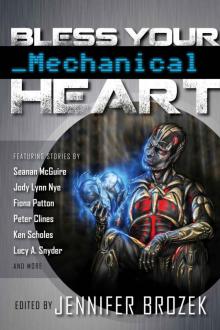 Bless Your Mechanical Heart
Bless Your Mechanical Heart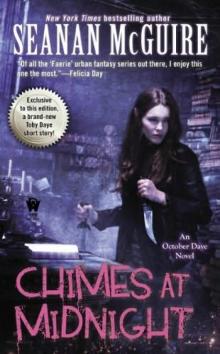 Chimes at Midnight od-7
Chimes at Midnight od-7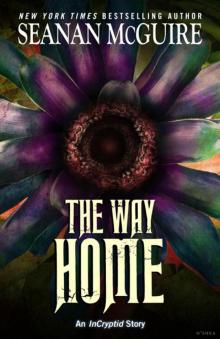 The Way Home
The Way Home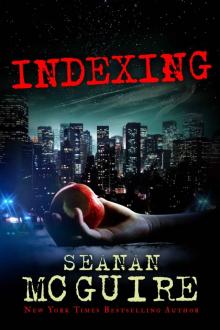 Indexing (Kindle Serial)
Indexing (Kindle Serial)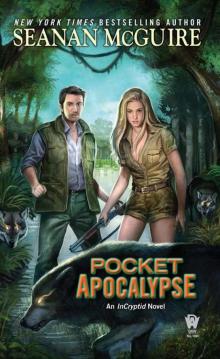 Pocket Apocalypse: InCryptid, Book Four
Pocket Apocalypse: InCryptid, Book Four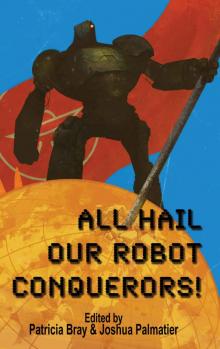 All Hail Our Robot Conquerors!
All Hail Our Robot Conquerors!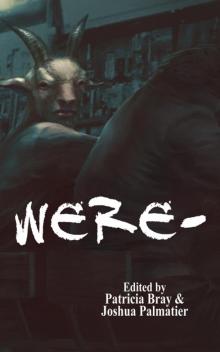 Were-
Were-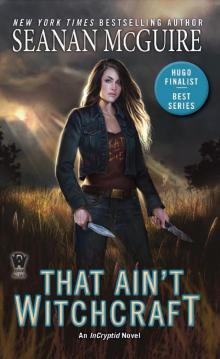 That Ain't Witchcraft (InCryptid #8)
That Ain't Witchcraft (InCryptid #8)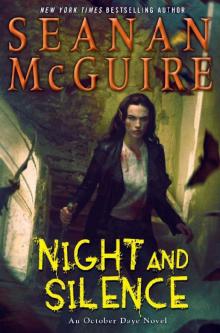 Night and Silence (October Daye)
Night and Silence (October Daye)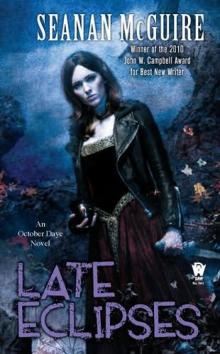 Late Eclipses od-4
Late Eclipses od-4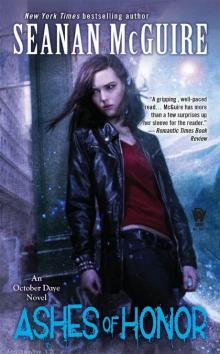 Ashes of Honor: An October Daye Novel
Ashes of Honor: An October Daye Novel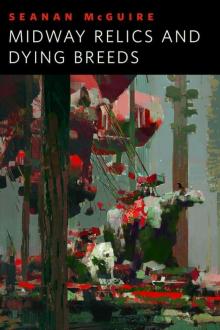 Midway Relics and Dying Breeds: A Tor.Com Original
Midway Relics and Dying Breeds: A Tor.Com Original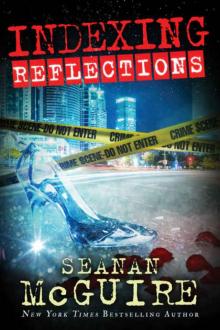 Indexing: Reflections (Kindle Serials) (Indexing Series Book 2)
Indexing: Reflections (Kindle Serials) (Indexing Series Book 2)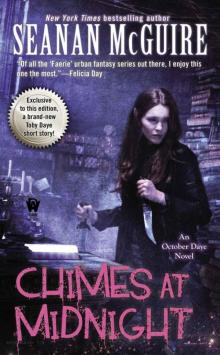 Chimes at Midnight: An October Daye Novel
Chimes at Midnight: An October Daye Novel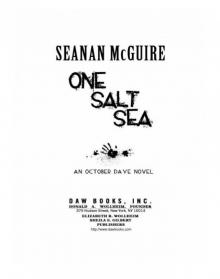 One Salt Sea: An October Daye Novel
One Salt Sea: An October Daye Novel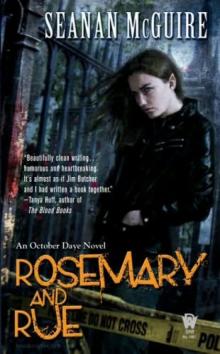 Rosemary and Rue od-1
Rosemary and Rue od-1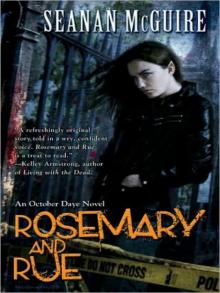 Rosemary and Rue: An October Daye Novel
Rosemary and Rue: An October Daye Novel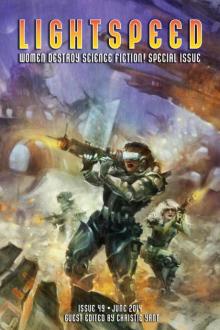 Lightspeed Magazine Issue 49
Lightspeed Magazine Issue 49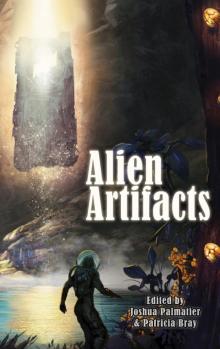 Alien Artifacts
Alien Artifacts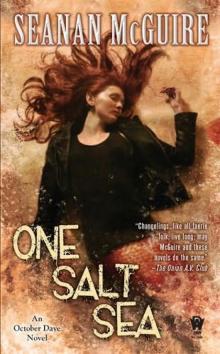 One Salt Sea od-5
One Salt Sea od-5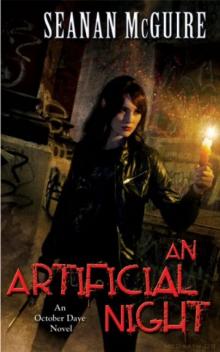 An Artificial Night od-3
An Artificial Night od-3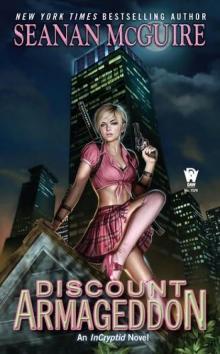 Discount Armageddon i-1
Discount Armageddon i-1